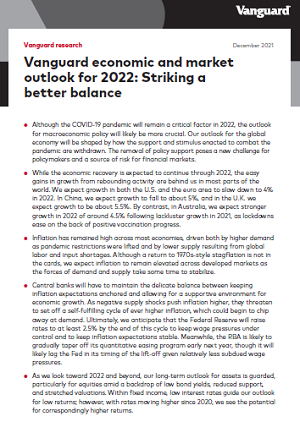Although the COVID-19 pandemic will remain a critical factor in 2022, the outlook for macroeconomic policy will likely be more crucial. Our outlook for the global economy will be shaped by how the support and stimulus enacted to combat the pandemic are withdrawn. The removal of policy support poses a new challenge for policymakers and a source of risk for financial markets.
While the economic recovery is expected to continue through 2022, the easy gains in growth from rebounding activity are behind us in most parts of the world. We expect growth in both the U.S. and the euro area to slow down to 4% in 2022. In China, we expect growth to fall to about 5%, and in the U.K. we expect growth to be about 5.5%. By contrast, in Australia, we expect stronger growth in 2022 of around 4.5% following lackluster growth in 2021, as lockdowns ease on the back of positive vaccination progress.
Inflation has remained high across most economies, driven both by higher demand as pandemic restrictions were lifted and by lower supply resulting from global labor and input shortages. Although a return to 1970s-style stagflation is not in the cards, we expect inflation to remain elevated across developed markets as the forces of demand and supply take some time to stabilize.
Central banks will have to maintain the delicate balance between keeping inflation expectations anchored and allowing for a supportive environment for economic growth. As negative supply shocks push inflation higher, they threaten to set off a self-fulfilling cycle of ever higher inflation, which could begin to chip away at demand. Ultimately, we anticipate that the Federal Reserve will raise rates to at least 2.5% by the end of this cycle to keep wage pressures under control and to keep inflation expectations stable. Meanwhile, the RBA is likely to gradually taper off its quantitative easing program early next year, though it will likely lag the Fed in its timing of the lift-off given relatively less subdued wage pressures.
As we look toward 2022 and beyond, our long-term outlook for assets is guarded, particularly for equities amid a backdrop of low bond yields, reduced support, and stretched valuations. Within fixed income, low interest rates guide our outlook for low returns; however, with rates moving higher since 2020, we see the potential for correspondingly higher returns.
Download the full paper here
